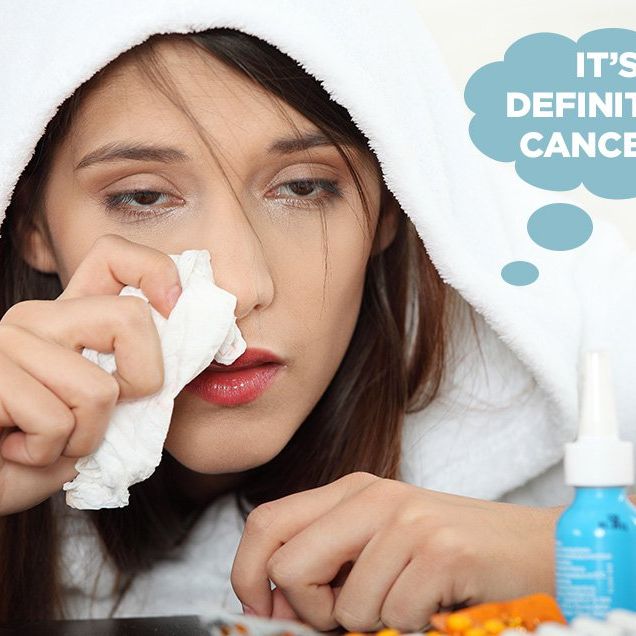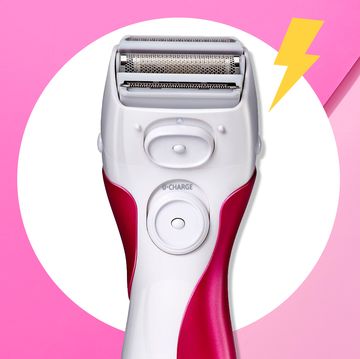If you lie in bed worrying about bills, work, and—oh yeah—that twitch in your thumb that must mean Parkinson’s disease is looming, you’re not alone. Lots of women stress over their health, and why wouldn’t they? Anyone who has spent two days down with the flu knows that it can make or break your quality of life. But for some of us, health anxieties can spiral out of control, leaving the brain (and even the body) a mess.
“It’s normal to focus in on a new symptom, but most people are able to say, ‘I seem to be in good health, this is probably temporary and not dangerous, I’ll wait and see if it goes away,’” says Jonathan Abramowitz, Ph.D., professor of psychology at the University of North Carolina (UNC) and director of UNC’s Anxiety and Stress Disorders Clinic.
Other women click through WebMD until they've convinced themselves that their persistent headache is a deadly brain tumor. They collect evidence and start obsessively checking their bodies for clues, fussing over every lump and bump.
But hypochondria (or “illness anxiety disorder” as docs now call it) isn’t just a cry for attention—most people who fret aren’t making their aches and pains up. “The body is noisy—it’s constantly making changes and adjusting to our environments,” says Abramowitz. “If you focus in on your heartbeat, you’ll probably notice a flutter or change in the beat. If you worry about your knee, you’ll likely feel some sort of sensation down there.”
And when you’re anxious or nervous, it often triggers a fight-or-flight response, causing adrenaline to kick in and cuing even more “oh crap, I'm dying” moments. While this physiological commotion just means your system is up and running—not that you’re about to keel over—it can be hard to talk yourself down in the moment. So the next time you’re in catastrophe mode, follow this playbook:
1. Look at the Evidence
Take a step back and play detective, looking objectively at your situation. (Or pretend you’re advising a friend who is having strange symptoms.) Ask yourself: What’s the evidence that supports the idea that you’ve got (insert fear here: a brain tumor, Zika, SARS…)? You’ll probably realize the benign explanations seem much more likely. “I meet with women in their twenties and thirties who think they’re having heart attacks, but they forget they’ve never had any concerns about their heart before and their doctor and medical tests say they’re OK,” says Abramowitz. “Don’t let logic go out the window.”
RELATED: The Dangers of Using Google to Self-Diagnose
2. Quit Googling
“Truly the best thing you can do is stop searching your symptoms online,” says Abramowitz. “Even if you find 30 websites that say you have nothing to worry about, the one website that suggests you’ve got something serious will stick in your brain.”
3. Find a Doctor Who Gets You
If you're really sweating over something, it’s never a bad idea to head to an M.D. to get it checked out. But you should be able to leave his or her office feeling confident that you’re A-OK, and that means forming a relationship with a doctor that you can talk to and trust, says Abramowitz.
RELATED: The Internet Just Got More Fun for Hypochondriacs
4. Put It in Perspective
“We take risks everyday—but most of us don’t get in the car and worry about crashing or getting hit,” says Abramowitz. “We accept loads of other mundane uncertainties. You won’t ever know for sure that your health is perfect, so we have to learn to live with that uncertainty, as we do with all those other unknowns.”
RELATED: Do You Have an Anxiety Disorder—Or Are You Just a Worrywart?
5. Get Professional Help
If your health anxiety doesn’t let up, consider seeking out a therapist for help. Cognitive Behavorial Therapy (CBT) is the most popular treatment for hypochondria. It involves both education (learning about that noisy body of yours) and exposure therapy. (This is a super effective behavior therapy for other anxiety disorders—you’ll focus on confronting your fears head on by triggering them through experiences like visiting a hospital or reading a book on the disease you're scared of.) Abramowitz also suggests reading It's Not All in Your Head: How Worrying about Your Health Could Be Making You Sick—and What You Can Do About It, which is almost like DIY CBT therapy—ideal for the cash- or time-strapped.















